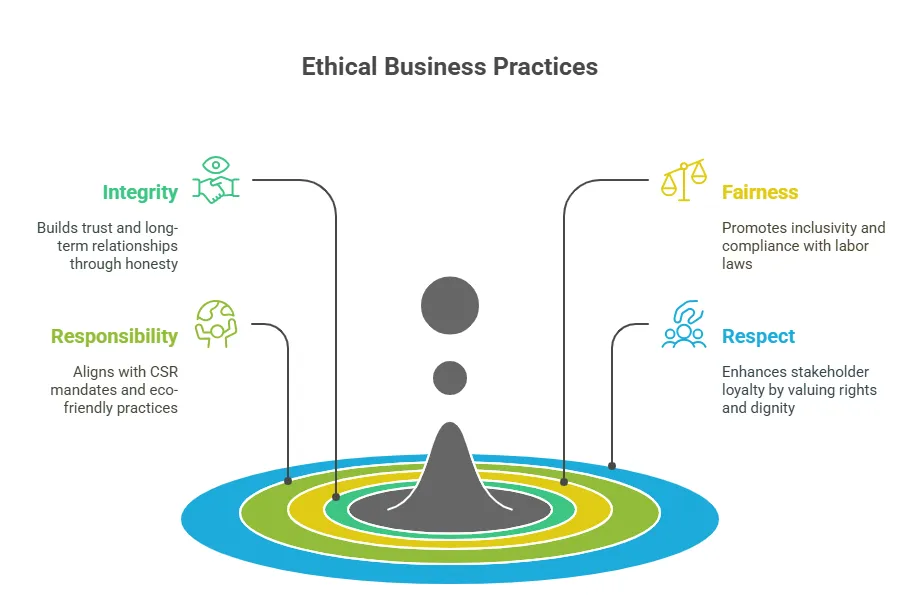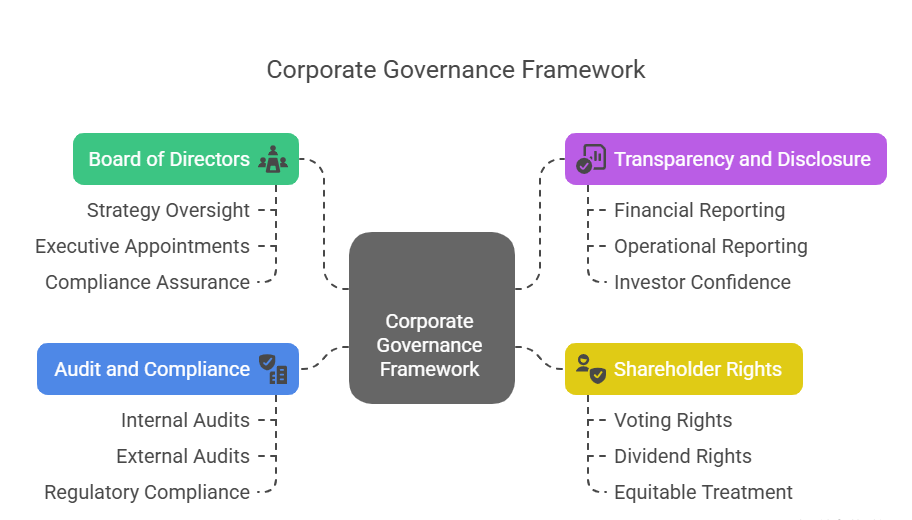Business ethics and corporate governance are foundational to building trust, ensuring sustainability, and driving success in modern organizations. These concepts are critical for excelling in Business Law and Economics exams and thriving in leadership or entrepreneurial roles. This article explores the principles of business ethics, the frameworks of corporate governance, and their business implications, such as fostering stakeholder confidence and enhancing economic performance. With practical examples, clear insights, and exam-focused tips, this guide will help you master ethical business practices and governance for academic and professional success.
Overview of Business Ethics
Business ethics refers to the principles and standards that guide behavior in organizations, ensuring decisions align with moral values like honesty, fairness, and responsibility. It governs how businesses interact with stakeholders—employees, customers, suppliers, and society—promoting ethical business practices that balance profit with purpose.
In India, business ethics is shaped by cultural values, legal frameworks like the Companies Act, 2013, and global standards. Ethical conduct helps businesses avoid legal risks, build reputations, and contribute to societal well-being, making it a core syllabus topic.
Key Principles of Business Ethics

- Integrity
- Acting with honesty and transparency in all dealings.
- Example: A retail firm discloses accurate product information to customers.
- Details: Builds trust and long-term relationships.
- Fairness
- Treating stakeholders equitably, avoiding discrimination or bias.
- Example: A service provider ensures equal pay for employees.
- Details: Promotes inclusivity and compliance with labor laws.
- Responsibility
- Owning the impact of business actions on society and the environment.
- Example: A manufacturing firm adopts eco-friendly production methods.
- Details: Aligns with corporate social responsibility (CSR) mandates.
- Respect
- Valuing stakeholder rights and dignity.
- Example: A consultancy firm protects client confidentiality.
- Details: Enhances stakeholder loyalty.
Exam Tip: Define these principles with examples for short-answer questions.
Corporate Governance Frameworks
Corporate governance is the system of rules, policies, and structures that directs and controls an organization, ensuring accountability, transparency, and fairness. In India, it is governed by the Companies Act, 2013 and guidelines from the Securities and Exchange Board of India (SEBI), particularly for listed companies. Corporate governance safeguards stakeholder interests, from shareholders to employees, and supports sustainable growth.
Key Aspects of Corporate Governance

- Board of Directors
- Oversees strategy, appoints executives, and ensures compliance (Section 149, Companies Act).
- Example: A board reviews financial reports to ensure transparency.
- Details: Includes independent directors to avoid conflicts of interest.
- Transparency and Disclosure
- Requires accurate reporting of financial and operational performance.
- Example: A firm publishes annual reports per SEBI guidelines.
- Details: Builds investor confidence and regulatory trust.
- Shareholder Rights
- Protects shareholders’ interests through voting and dividends.
- Example: A company holds regular AGMs to address shareholder queries.
- Details: Ensures equitable treatment under Section 166.
- Audit and Compliance
- Mandates internal and external audits to verify financial integrity.
- Example: An audit committee checks compliance with tax laws.
- Details: Aligns with SEBI’s Listing Obligations and Disclosure Requirements (LODR).
Table: Key Aspects of Corporate Governance
| Aspect | Key Benefit | Challenge | Exam Tip |
|---|---|---|---|
| Board of Directors | Strategic oversight | Conflicts of interest | Define roles in theory answers |
| Transparency | Builds investor trust | High disclosure costs | Link to SEBI in viva |
| Shareholder Rights | Ensures fairness | Managing diverse interests | Cite Section 166 in cases |
| Audit and Compliance | Enhances financial integrity | Complex regulations | Discuss audits in descriptive |
Exam Tip: Memorize Companies Act sections (e.g., 149, 166) for viva questions.
Interconnection Between Business Ethics and Corporate Governance
Business ethics and corporate governance are interlinked, as ethical principles guide governance practices, and robust governance enforces ethical business practices. For instance, a company with strong corporate governance (e.g., transparent reporting) reinforces integrity, a core ethical principle. Conversely, ethical leadership ensures governance policies are implemented with fairness and responsibility.
- Example: A manufacturing firm’s board enforces an ethical code of conduct, ensuring fair supplier contracts and transparent financials.
- Details: Ethics shapes board decisions, while governance provides mechanisms like audits to uphold ethical standards.
This synergy fosters trust, reduces legal risks, and aligns business goals with societal expectations, making it a key exam topic.
Exam Tip: Explain how ethics supports governance in case-based questions.
Business and Economic Implications
Business ethics and corporate governance have profound business implications, driving organizational success and economic stability:
- Stakeholder Trust
- Ethical practices and transparent governance build confidence among customers, investors, and employees.
- Example: A service firm’s ethical hiring practices attract talent.
- Economic Impact: Enhances brand loyalty and market share.
- Sustainability
- Ethical operations and CSR-focused governance promote long-term viability.
- Example: A retail firm reduces waste to meet environmental standards.
- Economic Impact: Attracts socially conscious investors.
- Regulatory Compliance
- Strong governance ensures adherence to laws, avoiding penalties.
- Example: A company complies with SEBI’s disclosure norms.
- Economic Impact: Reduces legal costs and risks.
- Profitability
- Ethical practices and governance improve efficiency and reputation, boosting profits.
- Example: A trading firm’s transparent pricing attracts more clients.
- Economic Impact: Strengthens financial performance.
Table: Business Implications of Ethics and Governance
| Implication | Economic Benefit | Practical Challenge | Exam Tip |
|---|---|---|---|
| Stakeholder Trust | Enhances brand value | Managing expectations | Link to ethics in theory |
| Sustainability | Attracts ethical investors | High implementation costs | Discuss CSR in viva |
| Regulatory Compliance | Avoids legal penalties | Complex reporting | Cite Companies Act in cases |
| Profitability | Improves financial performance | Balancing ethics and profits | Explain benefits in descriptive |
Exam Tip: Link implications to economic outcomes (e.g., trust drives revenue) in long-answer questions.
Challenges in Implementing Ethics and Governance
Adopting business ethics and corporate governance faces several hurdles, with solutions:
- Ethical Dilemmas
- Conflicts between profit and ethics create decision-making challenges.
- Example: A manufacturing firm faces pressure to cut costs unethically.
- Solution: Establish a code of conduct with clear guidelines.
- Compliance Costs
- Governance requirements like audits increase expenses.
- Example: A small firm struggles with SEBI reporting costs.
- Solution: Use technology to streamline compliance processes.
- Resistance to Change
- Employees or management may resist ethical or governance reforms.
- Example: A trading firm’s staff opposes new transparency policies.
- Solution: Conduct training to promote ethical culture.
- Global Variations
- Differing ethical standards across countries complicate operations.
- Example: An export firm navigates varying labor laws abroad.
- Solution: Align with global frameworks like UN Global Compact.
Exam Tip: Discuss challenges with solutions in descriptive answers for depth.
Understanding Valid Contracts and Types of Contracts Under the Indian Contract Act
Practical Applications in Business
Business ethics and corporate governance deliver tangible benefits:
- Reputation Building: Ethical practices enhance brand image.
- Example: A retail firm’s fair pricing wins customer loyalty.
- Investor Attraction: Transparent governance draws funding.
- Example: A company’s clear financials attract shareholders.
- Employee Retention: Ethical workplaces boost morale.
- Example: A service firm’s fair policies retain talent.
- Risk Mitigation: Governance reduces legal and financial risks.
- Example: A manufacturing firm’s audits prevent fraud.
Example Scenario: A consultancy firm adopts business ethics by ensuring client confidentiality and fair billing, while its board enforces corporate governance through regular audits and transparent reporting. This builds client trust, attracts investors, and ensures compliance, driving growth.
Tips to Master Business Ethics and Corporate Governance for Exams
To excel in Business Law and Economics:
- Learn Principles: Memorize ethics principles (e.g., integrity, fairness) and governance aspects (e.g., board roles).
- Understand Links: Explain how ethics and governance complement each other.
- Use Tables: Revise principles and implications for quick recall.
- Check Resources: Visit SEBI for governance guidelines.
- Prep for Vivas: Discuss CSR or board duties with examples.
Conclusion
Business ethics and corporate governance are vital for fostering ethical business practices, ensuring accountability, and driving sustainable success. By mastering their principles—integrity, transparency, and responsibility—you can excel in exams and apply these concepts in leadership roles. Use this guide to navigate business ethics and corporate governance, and explore resources like Ministry of Corporate Affairs to deepen your knowledge and stay ahead in your career.
👨💼 Author: BBAProject Editorial Team
✍️ The BBAProject Editorial Team comprises business graduates and educators dedicated to creating practical, syllabus-based learning resources for BBA students.
⚠️ Please Note: Articles published on BBAProject.in are well-researched and regularly updated. However, students are advised to verify data, statistics, or references before using them for academic submissions.

